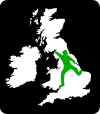
- The most recent issue to be published was 133
- For further information, please see Publishing/Despatch Schedule
- Database last updated on Sun, 25 Jan 2026 16:24:22 +0000
- Online access is currently available for all issues. Some of
the older issues are bit-map scans rather than digital copies.
journal scans.
- Online voting for CREG articles was withdrawn in June 2022. For info see
Voting for CREG articles
Contents of journal 19
March 1995
This page may take a few
seconds to load. Please wait ...
CREG Journal Archive:
This issue is available on paper as part of a two-volume archive,
covering issues 1 to 25.
To purchase it, please visit
Lulu.com.
- CREG Journal
(PDF 6.1MB)
  Individual articles may be available below Individual articles may be available below
- Contents. (This is a bit-map scan).
-
- Reviews of Literature Received
- David Gibson lists some papers which readers have sent in.
-
- The Autumn '94 Field Meeting
- Mike Bedford reports on the field meeting in Nidderdale.
-
- The Use of VHF/UHF to Help in Locating Dig Points
- Steve Laugher shows how VHF walkie-talkies can be used to locate digs from the surface.
-
- Earth Current / Induction Field Experiments
- Following David Gibson's assertion that an earth current signal could be received inductively, Rob Gill put it to the test obtaining encouraging results.
-
- Collapsible VHF Yagis
- Experiments at the field meeting used collapsible Yagis to attempt long distance communication along passages. Mike Bedford reports.
-
- A Preliminary Underground Spectrum Survey
- With a view to selecting ideal frequencies for new cave radios, John Rabson describes how he set the ball rolling at the field meeting.
-
- Lithium-ion Cells
- An overview of these new cells by David Gibson.
-
- Experimenting with Capacitive Couplers for SWTs
- Experiments with different designs of capacitive couplers for earth return telephones are described by Nigel Lovell.
-
- Designing a Capacitive Coupler for an SWT
- Some theoretical guidance by David Gibson.
-
- Losses in Tuning Capacitors
- David Gibson described the effect of dielectric losses in the tuning capacitors of loop antennas and indicates which types of capacitor have the lowest loss.
-
- Experimental High-energy Flashgun
- Chris Vernon describes his 90J flashgun and presents the circuit diagram.
-
- Update - Type-approved Transmitter Module
- Following some misunderstanding regarding articles in the last Journal, David Gibson clarifies his ideas for a type-approved transmitter module.
-
- Headlite Performance Tests
- Test results on Speleo Technics' new NiCd lamp, reported by Keith Lewis.
-
- Cave Radio Notebook
- In this new series, David Gibson presents notes on 1: aperture synthesis, 2: spectrum analysis, 3: digitised speech.
-
- An Advanced Method of Soft Speech Clipping - part 2
- Bill Purvis describes the algorithm used and the results obtained with an experimental method of digital speech processing.
-
- Wet & Dry
- Our regular(ish) column on waterproof electronics. David Gibson describes Pelican cases, Hexseals and waterproof speakers.
-
- The Proximity Effect - part 1
- David Gibson describes this little-discussed effect which was described by Butterworth in 1926.
-

|

View Contents:

BCRA is a UK registered charity and is a constituent body of
the British Caving Association,
undertaking charitable activities on behalf of the BCA.
BCRA publishes a range of periodicals and books.
Click here for further information.
|
Searching
To Search our pages using Google, type a search
string in the box at the top of the page and hit your Return key
You can also search our publications catalogue at the British Caving Library
The CREG Journal Search Engine is a new, powerful search engine which will, sometime, be extended
to cover Cave & Karst Science. We have a keyword search facility on our Cave Science Indexes pages but this may be rather out-of-date.
|
For staff use: Link to Database
Show/Hide
download figures next to each item (if available and non-zero; you might need to refresh page first). Counters last
reset on Thu 03-Jan-2019 17:29:28 +00:00. The figures are non-unique
click-throughs.
|









